Dental Implants – Baytown, TX
The Modern Solution for Missing Teeth

After you’ve lost one or more teeth, dental implants are the closest thing to having them back. Unlike other options for tooth replacement, dental implants bring back the roots of teeth below the gumline, making them just as sturdy and reliable as your original smile. Here at Baytown Gentle Dental, Dr. Seif can place and restore dental implants with a 98% success rate – much higher than average. Call our dental office today to schedule your consultation to learn more about replacing missing teeth with dental implants in Baytown, TX!
Why Choose Baytown Gentle Dental for Dental Implants?
- Entire Dental Implant Process Completed In-House
- CBCT Scanner for Enhanced Treatment Planning
- Experienced Dentist with an Artistic Eye
What Are Dental Implants?

Dental implants are small, screw-like posts made from titanium. During a brief oral surgery procedure, these posts are placed into your jaw where the roots of your teeth once were. Titanium is biocompatible, meaning the implants encourage the bone to grow around them. After several months, the implants become fully integrated with your jawbone, allowing them to sturdily support any number of prosthetic teeth.
The 4-Step Dental Implant Process

Unlike getting a traditional denture or dental bridge, getting dental implants requires a multistep process that can take several months to complete. This may seem like quite a wait, but the long-term benefits make this all worthwhile. At Baytown Gentle Dental, we can complete the entire treatment process ourselves instead of referring you someplace else. Here are the four main steps that you can expect to experience when you get dental implants.
Initial Dental Implant Consultation

The first thing that happens in the dental implant process is your initial consultation. During this appointment, we will look at your smile and surrounding facial structures. This will help Dr. Seif figure out whether dental implants are the best option for you and how they should be placed in your mouth. During your consultation, we are also happy to talk through the entire process, including the timeline and the cost.
Sometimes, patients end up needing preliminary procedures ahead of time before they can proceed with the implant placement process. This could include bone grafting, gum disease therapy, and tooth extractions. After this, we can move forward to planning the rest of your treatment.
Dental Implant Surgery
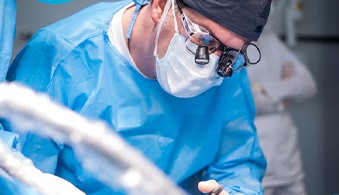
When the day of your implant placement surgery comes around, your mouth will first be numbed with a local anesthetic. Next, a small incision is made into the gum tissue to access your jawbone. The implants are placed at very precise angles and locations. The last step is for the gums to be closed and protective caps to be placed over the implant posts to keep them safe throughout the duration of the healing process.
Dental Implant Osseointegration & Abutment Placement
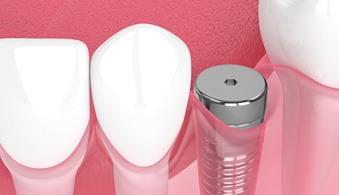
For the next few months, the fusion process will take place between the implant and your jawbone. This process is called “osseointegration.: This allows for implants to have a sturdier foundation so that your replacement teeth stay firmly in place when you speak and chew. When this process is completed, the metal abutments will be placed on the ends of your implants.
Delivery of Dental Implant Restorations

After your abutment has been placed, your restoration should be ready to go! You may return to the practice where Dr. Seif will place your new crown, bridge, or denture (depending on the number of teeth you are having replaced). At this time, we will check to make sure that your bite is comfortable so you can enjoy the benefits of your completed smile!
Benefits of Dental Implants

Dental implants are one of the most popular ways to replace missing teeth, and there is no wonder why. This tooth replacement option offers a wide array of benefits that you can’t get from dentures or dental bridges. Dental implants can dramatically improve your confidence, health, and quality of life!
Day-to-Day Benefits

Dental implants feel just like natural teeth do once they have completely healed. You should be able to enjoy all of the same things you did before you lost your teeth. Here are some of the amazing benefits that you can experience every single day:
- Restore Bite Force: Your bite force can be restored by 80% or more! This is much more than you can experience with bridges and dentures.
- Easy to Maintain: You care for implants the same way you care for natural teeth. Just brush, floss, rinse, and see your dentist for regular cleanings and checkups.
- Smile Confidently: You don’t need to worry about visible gaps in your smile or ill-fitting dentures slipping around. Instead, you can smile with confidence.
Health Benefits

Your health will also be positively influenced when you get dental implants. Here are a few of the benefits you can experience:
- Improved Dental Health: This means a lower risk of cavities, gum disease, infection, and losing additional teeth.
- Prevention of Bone Loss: When you are missing teeth, jawbone deterioration is sure to follow. Fortunately, dental implants stimulate the jawbone to keep it strong.
- Better General Health: Great dental health impacts your overall health. This can lower your risk of serious medical conditions, like diabetes and heart disease.
Long-Term Benefits

Dental implants are a long-term investment in your smile. Here are some benefits that you will experience for many years to come:
- Save Money: You don’t need to stock up on adhesives or soaking solutions, and you don’t need to worry about frequent repairs or replacements. Dental implants also reduce your risk of many oral health issues, so you are less likely to require costly treatments that will add up over time.
- Long-Lasting: Dental implants can last upwards of 30 years or even the rest of your life!
- Successful: Dental implants have a success rate of over 95%. Your chances of dental implant failure are very low.
Who Dental Implants Can Help
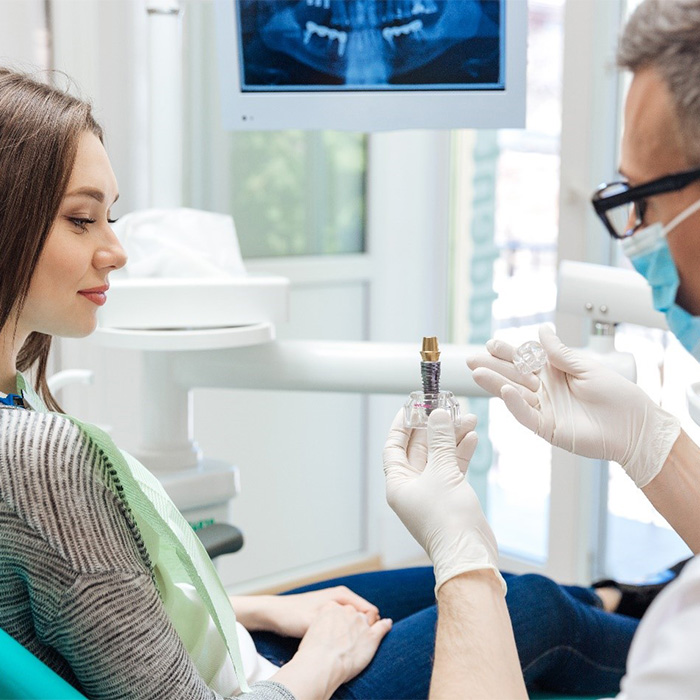
The truth is that most adults in generally good health can qualify for dental implants. So long as your mouth is in decent shape, you can get treatment whether you’ve lost one tooth or many. However, you should still consult Dr. Seif before you commit to anything. He can perform a close oral exam to confirm whether implants suit your smile. To learn more about qualifying for dental implants in Bayton, please keep reading or call our office.
Who is a Good Candidate for Dental Implants?
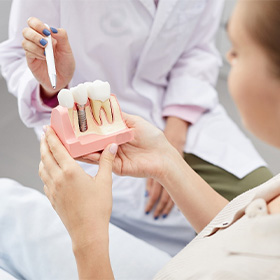
As stated before, a fairly healthy adult can qualify for dental implants. The treatment doesn’t have many requirements aside from prior tooth loss. Still, the dental implant process does benefit some patients more than others. The most ideal candidates for it usually have these three traits:
- Good Overall Health – Implant placement is a surgery, so your body must be strong to bear it. It’ll cause adverse side effects otherwise.
- Great Oral Health – Cavities and gum disease can cause implant failure unless they're treated. That means you’ll need to have such issues fixed before implant surgery.
- Adequate Jawbone Density – Your jaw needs a high density to support dental implants, as a weak jawbone will lead to implant failure.
Of course, you can still become an implant candidate later if you aren’t one now. You’ll just need to undergo preliminary dental work first– treatments like tooth extractions, gum disease therapy, or bone grafts. These services should strengthen your mouth and jaw enough to support dental implants. We can then draft a treatment plan around how many teeth you’re missing.
Missing One Tooth

You only need a single implant post and crown to restore your smile when you're missing one tooth. These prosthetics will blend seamlessly and last a long while with proper care – even longer than a dental bridge. Regarding the actual placement, Dr. Seif won’t need to alter any adjacent teeth. Doing so would only weaken them and cause sensitivity.
Missing Multiple Teeth

If you’ve lost several adjacent teeth, you could consider an implant bridge. This device relies on two implant posts for support, not the typical dental crowns. Therefore, it doesn’t rely on natural teeth like a standard dental bridge. Dr. Seif doesn’t have to remove enamel to place it in your mouth.
When the missing teeth are spread throughout your mouth, a partial implant denture is the better choice. This appliance uses several implant posts to anchor itself.
Missing All Teeth

You should look into a full implant denture once you’ve lost (or soon will) all your teeth. Using just a few well-placed dental implants, it can restore an entire arch. This denture also won’t slip around like a typical can at times. Since its implant posts are adjusted and placed precisely, it has a high degree of stability and functionality.
Understanding the Cost of Dental Implants

We customize every dental implant treatment to meet each patient's unique needs. As a result, the cost of dental implants can be wildly different from one patient to the next. During your initial consultation with your implant dentist in Baytown, we’ll lay out all of the factors that could impact the price of your treatment, such as the number of teeth you’re replacing. We’ll also go over your options for making your new teeth affordable, such as insurance benefits and in-house financing.
Preliminary Treatments & Dental Implant Surgery

Sometimes, a patient needs treatment prior to the implant placement procedure. For instance, perhaps they require a bone graft or an extraction before they can move forward with dental implants. If this is the case for you, this preliminary work will add to the overall cost. The surgery itself may vary in cost depending on how many implants are being inserted and where in the mouth they are going.
The Parts of Your Dental Implant

If you go to a store, you’ll see many brands available for the same product. These various options come with certain advantages or specialties. The same can be said for dental implants. Although you won’t find the parts of your implant at the store, there are several brands for posts, abutments, and restorations. Considering your needs, Dr. Seif will select the brands that will best serve your smile, impacting the cost.
How Dental Implants Pay for Themselves

Looking at the upfront price only, dental implants usually surpass traditional dentures or bridges. However, when you consider all the benefits implants provide, you realize that you get what you pay for. Dental implants are the closest alternative to natural teeth and keep the jawbone healthy and strong. As a result, you don’t have to worry about replacing your prosthetic teeth quite as often. In fact, when you add up the cost you’ll have to pay to replace your dentures or bridge over the years, you may find that implants are actually more cost effective!
Does My Dental Insurance Cover Dental Implants?

Different insurance companies and plans can have various coverage, but in general policies rarely include dental implants. However, there could be parts of the overall treatment that insurance will help pay for. For example, required preliminary work may be covered in part by insurance, and the cost you pay for the restoration attached to the implant(s) may be reduced because of your dental insurance.
Making Dental Implants Affordable

With or without the assistance of dental insurance, we can help you make dental implants fit within your budget. How can we accomplish this? Through low-interest financing with Lending Club or CareCredit. These nationwide companies are well known to break up the one-time sum owed into easier monthly payments, putting treatments like dental implants within financial reach.
Dental Implant Failure & Salvage

Although these titanium posts typically have a success rate of over 95%, there’s always an incredibly tiny chance that they can fail. This can be due to a wide range of reasons, and our team will need to address the situation right away to help you maintain your results. That’s where we can provide dental implant salvage treatment in Baytown! Keep reading to learn more about what can make your metal posts fail and how our team can address the problem so that you can return to enjoying your full bite again.
Learn More About Dental Implant Failure & Salvage
Dental Implant Post-Op Instructions

After your dental implant surgery is complete, you will need to give the area time to heal. We will give you detailed instructions to abide by so that you can heal as quickly and comfortably as possible. If you have any questions or concerns, don’t hesitate to contact us. Everyone’s treatment looks a little bit different, but here’s what one can generally expect.
What to Do Directly After Dental Implant Surgery

The number one priority during the healing process is to leave the blood clot at the surgical site alone. This is necessary for the area to heal. Here are some rules to help you achieve this:
- Don’t spit – use a tissue or swallow your saliva
- Don’t use a straw when drinking
- Don’t smoke after surgery
- Keep your tongue and fingers away from the surgical site
Common Side Effects When Recovering from Dental Implant Placement

You will likely experience some minor side effects for a few days after your surgery with these being the most common:
- Bleeding: Minor bleeding is common for a few days after surgery. To reduce bleeding, use gauze and light pressure.
- Swelling: For the first 72 hours after your procedure, inflammation is likely. Use a cold compress to reduce this.
- Discomfort: Soreness is normal after dental implant surgery. This can be managed with over-the-counter and prescribed pain relievers.
Your Diet After Dental Implant Surgery

After your surgery, it’s recommended that you stick to a soft-food diet to avoid aggravating the dental implant site. Here are some foods that you can enjoy at this time:
- Scrambled eggs
- Mashed potatoes
- Apple sauce
- Oatmeal
- Ice cream
- Apple sauce
- Pasta
- Soup
- Pudding
Post-Op Health & Oral Hygiene

The day following your surgery, brush your teeth as you normally would. Just be careful to avoid the surgical site. To keep this area clean, gently rinse your mouth with salt water after meals. When you use mouthwash, make sure to choose one that doesn’t contain alcohol. This can aggravate the surgical site.
What to Do After Your New Teeth Are Attached

Now that your replacement teeth are secured to your dental implants, the hard part is done! You may notice some minor sensitivity as your mouth adjusts, but this should be easy to manage and temporary. You shouldn’t experience any bleeding, swelling, or extensive recovery. If you have any questions or concerns, don’t hesitate to contact us so we can help.
Maintaining & Caring for Your Dental Implants

Although the dental implant process requires an investment of your valuable time and money, there’s a good payoff because they can last for 30+ years! The key is taking good care of them so you reduce the chances of them “failing.” If you aren’t sure what that entails, read on!
Make Oral Hygiene a Priority

Peri-implantitis, a form of gum disease, is one of the leading causes of dental implant failure. So, you can see why it’s so important that you make oral hygiene a priority! The first step is brushing your teeth twice a day (and making sure that you get a new toothbrush every quarter). The second step is flossing and rinsing with mouthwash each evening to keep your breath fresh, prevent plaque build-up, and clean the hard-to-reach areas of your mouth.
Eat a Healthy Diet

Eating a healthy diet is also important because your body needs essential vitamins, minerals, and nutrients to keep your jawbone strong and your teeth healthy. So, do your best to fill up on plain yogurt, bananas, oatmeal, low-sugar applesauce, and other softer foods that benefit your oral and overall health. It’s also important that you don’t over-indulge on sugary and starchy snacks, like potato chips, pretzels, caramel candies, and ice cream.
Break Bad Habits

Most patients think of smoking when they think of bad dental habits. That’s certainly one of them, but it’s not the only one. To prevent your dental implant from coming loose or your restoration from breaking, you shouldn’t bite your nails, chew on ice cubes, or use your teeth as tools to open things. It’s also important that you only drink alcohol sparingly and that you break any bad habits related to your dental care regimen, like not flossing consistently.
Protect Your Dental Implants
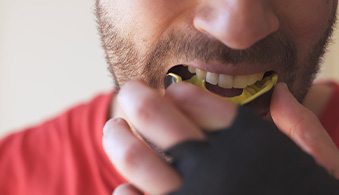
Do you play football, lift weights, ride your bike, or run? If so, you should have a mouthguard! That way, your teeth and your dental implants are protected from unforeseen impact, a bad fall, or chronic clenching. We also recommend having a nightguard made if you have Bruxism. If you don’t have one, let us know! We can have a custom one made for you, helping to prolong the lifespan of your dental implants in the process.
Schedule Regular Dental Checkups

Last, but not least, you need to come to our Baytown dental office every six months. During the examination portion, Dr. Ashraf Seif will screen for oral cancer, check the condition of your dental implants, and take a look at your teeth and gums. During the cleaning portion, we will gently remove plaque and tartar, reducing your risk of oral health problems moving forward.
Dental Implant FAQs
How Long Do Dental Implants Last?
Dental implants are considered permanent tooth restorations and can last 30+ years with proper care and maintenance; however, their lifespan greatly depends on your health and lifestyle.
To ensure that your dental implants last as long as possible, be sure to brush your teeth twice daily, and floss and use mouthwash daily. It is also important to attend your regular biannual exam and cleaning appointments with Dr. Seif.
Never use your dental implants (or teeth!) to open packaging and avoid foods that are too hard or sticky. Quitting smoking is not only beneficial to your overall health, but it can also help prevent dental implant failure.
Can I Take Dental Implants Out?
No, you cannot take your dental implants out yourself, as they are permanently fixed to the jawbone. They would need to be removed by a dental professional. Do not attempt to remove them yourself.
There are some types of implant dentures that can be removed for cleaning. Dr. Seif can discuss these with you at your dental implant consultation if they are a good option for your situation.
How Successful Are Dental Implants?
When placed by a skilled professional, dental implants have an impressive success rate of over 95 percent, even after ten years!
However, their success depends on how well you care for them with regular oral hygiene, routine dental checkups and cleanings, avoiding smoking, and eating a healthy diet.
Implant success can also vary depending on the location of the implant in your mouth. Molars endure more strain from chewing than your front teeth do, so they may be more likely to fail.
What Can Cause Dental Implants to Fail?
While it is uncommon, dental implant failure can occasionally happen. It usually occurs for one of two reasons: peri-implantitis, or failed osseointegration.
Peri-implantitis is a type of gum disease that can develop from poor oral hygiene habits and damage the bone and gums supporting the dental implant. This can cause it to loosen.
In some cases, the implant may fail to integrate properly with the jawbone. Patients with low jawbone density are at greater risk for this type of complication.
Other causes of dental implant failure could include chronic teeth grinding (bruxism), tobacco use, poor oral hygiene, certain medications, radiation to the head and neck, and certain other health conditions like diabetes, cancer, osteoporosis or autoimmune disorders.
Dr. Seif will provide you with guidelines for minimizing your risk of implant failure, including aftercare instructions to follow after your procedure.
I Need a Checkup & Cleaning I Need a Dentist for My Child I am Concerned About Bleeding Gums I Have a Cavity or Broken Tooth I am Missing One or More Teeth I Want to Enhance My Smile I am Scared of the Dentist I am in Pain & Need Help I am Concerned About Sleep Apnea View Our Services




